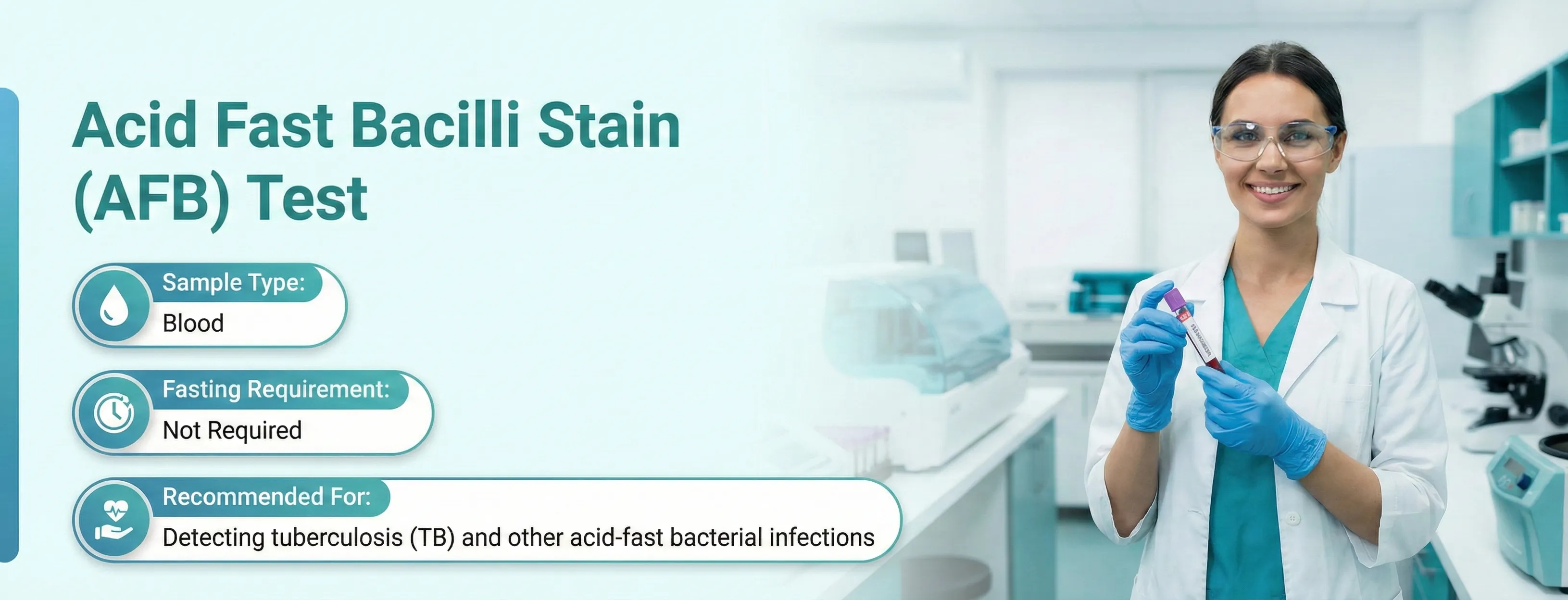3+ orders placed in your location
100% NABL & ISO Certified Lab • 100% Accurate Reports
Acid Fast Bacilli Stain (AFB) Test
Acid-fast bacillus test, AFB smear for tuberculosis
- Reports WithinN/AView Sample Report100% NABL & ISO Certified Labs
- SampleBlood
- FastingNot Required
PharmEasy Promises
Know More About The Test
A quick info Acid Fast Bacilli Stain (AFB) Test
Overview
An acid-fast bacillus is a group of bacteria with a physical property that allows them to resist decolourisation when they are stained using acids during staining procedures. The AFB stain test uses this property to detect the presence of this bacteria since the bacteria can not be decolourised using acids. This unique characteristic makes it simple to detect the presence of acid-fast bacilli using a simple diagnostic test.
The acid-fast stain test is specifically used for the detection of M. tuberculosis that causes tuberculosis. Tuberculosis is a potentially fatal infection that is infectious in nature and spreads from person to person through tiny air droplets released in the air when an affected person coughs or sneezes. The AFB test uses sputum; a thick mucus coughed up from the lungs that are different from saliva or spit. This disease mainly affects the lungs and requires a patient to take medications to get rid of tuberculosis.
Many tuberculosis strains are resistant to the medications used to treat TB. Hence, people with active tuberculosis may need to take several drugs to get free from the infection entirely and to prevent antibiotic resistance.
Doctors prescribe the acid-fast bacilli stain test to people who display symptoms of tuberculosis. These symptoms include persistent cough for three or more weeks, coughing blood and mucus, chest pain, chronic fever, night sweats and chills, etc. Tuberculosis can also affect other parts of your body such as kidneys or the brain. The symptoms can vary if TB occurs outside your lungs.
Approximately the average prevalence of all forms of TB across India was estimated to be 5 per thousand. There is a prevalence of around 2.27 per thousand smear-positive cases, with an average annual incidence of 84 per 1,00,000 smear-positive cases annually.
Other names of AFB stain test
- Acid-fast bacillus smear
- AFB smear
- Mycobacteria smear
What does the acid-fast bacilli stain test measure and who is it prescribed to?
The acid-fast bacillus stain test identifies the presence of acid-fast bacillus in the sputum sample of the patient. Your doctor may prescribe the test to you if they suspect you have tuberculosis. Tuberculosis is transmitted through the air and is considered a health risk. TB can be active or latent. If you have active tuberculosis, you will have symptoms and could spread the disease to others. If you have latent TB, you have the bacilli in your body, but you can't spread the infection to others.
The AFB test can help diagnose, track and reduce the spread of tuberculosis in at-risk populations and also helps healthcare providers in determining the effectiveness of the treatment.
Your doctor may order an acid-fast bacilli test if you have the following symptoms:
- Cough that has lasted for three weeks or more
- Coughing up blood or sputum
- Night sweats
- Chills
- Fever
- Fatigue
- Chest pain
- Unexplained weight loss
- Skin lesions
- Skin nodules
- Skin discolouration
- Thickened skin
- Nasal congestion
- Nosebleeds
Symptoms can differ if tuberculosis has affected some other part of your body other than the lungs. These symptoms include,
- Blood in urine
- Headache
- Joint pain
- Weakness
- Back Pain
Some conditions for which doctors may prescribe the acid-fast stain test are:
- Tuberculosis
- Leprosy
You can also be asked to get the AFB stain test procedure if you have been in close contact with someone who has been diagnosed with TB. Your doctor may also order the test if you have diseases like HIV or other medical conditions that weaken the immune system.
The AFB stain test also helps identify another group of bacteria called the Nontuberculous mycobacteria (NTM). This bacteria can also cause lung infections and disseminated diseases in people with weak immune systems.
Sample Type
The acid-fast bacilli stain test results are evaluated through a sputum sample and analysis if the acid-fast bacteria are present in the sputum.
Test Preparation
There is no special preparation required for the AFB stain test. Sputum is the most commonly collected sample. Usually, a healthcare provider will collect three early morning samples obtained by deep coughing on consecutive days. The sample is collected in sterile cups to increase the chances of correctly identifying the bacteria.
If a patient cannot produce sputum, the doctor may collect the sample using a procedure called bronchoscopy. This procedure allows the provider to look at and collect the required samples from the bronchi and bronchioles (tubes that carry air from your windpipe to your lungs).
Local anaesthesia will be sprayed onto your upper airway. Later the doctor will insert a tube into the bronchi and aspirate fluid samples used for testing. Sometimes, the provider may introduce a small amount of saline via the tube into the bronchi. Then they will aspirate it to collect bronchial washing.
Young children may not be able to produce sputum samples. For them, gastric washes or aspirates may be collected. This requires introducing saline into the stomach via a tube. Later the fluid is aspirated to collect gastric washing for testing.
If your doctor suspects that some other body parts are affected by tuberculosis, they may test body fluids and tissues from the affected body part. If a practitioner suspects that your kidney has been affected, one or more urine samples will be collected. Fluids from other body cavities or joints may be collected to diagnose the presence of tuberculosis.
Test inclusions: What parameters are included?
The AFB test measures one parameter: the presence of acid-fast bacilli bacteria. Mycobacteria are a group of rod-shaped bacteria (bacilli) that can be viewed under a microscope after a staining procedure. Tuberculosis-causing bacteria retain the colour of the stain after an acid wash. The acid-fast stain test detects the presence of the bacteria in a person's sample and helps identify the infection caused by the bacilli. Tuberculosis-causing bacteria retain the colour of the stain after an acid wash.
Several types of acid-fast bacteria can be detected via the AFB stain test. However, the most prevalent and infectious species is Mycobacterium tuberculosis which causes tuberculosis.
How frequently should you take this test?
Doctors prescribe the acid-fast bacilli stain test when they suspect the presence of tuberculosis lung infection. If you have signs of the disease such as fever, chills, and persistent cough, your doctor may suspect TB. Your healthcare provider can also order the AFB test if you are in a high-risk group for developing active tuberculosis.
If you are diagnosed with tuberculosis, your doctor may ask you to repeat the AFB test at a specific frequency to determine the prognosis of the disease. The frequency of the repeat tests will be determined by the medication regimen you are on and at the doctor's discretion.
Risk Assessment
Tuberculosis, Leprosy
Ranges
The result of the acid-fast bacilli stain test can be either positive or negative. If your result is normal or negative, that indicates no presence of a mycobacterial organism.
If the test is abnormal, it indicates you tested positive for one of these organisms:
- M. tuberculosis
- M. leprae
- Non Tuberculosis bacteria
- Other acid-fast bacteria
This test does not evaluate the functioning or disorder of any organ. It only indicates the presence of acid-fast bacilli that can cause infections.
Test Result Interpretation
If your AFB test is negative, it may mean that there is no infection present and some other bacteria are causing the symptoms. It can also indicate that the mycobacteria were not present in sufficient amounts in the sample to be detected. That is why three samples are usually taken to increase the chances of correctly identifying the organism.
If your sample tested negative and you still display the likelihood of tuberculosis, your doctor can order additional tests on other days.
A positive AFB stain test indicates the probability of mycobacterial infection. But a culture test will be done to confirm the final diagnosis and identify the species of mycobacteria present in your body. Later, you can be given a susceptibility test that will determine the most effective antibiotics against the strain present in your sample.
Was This Test Information Helpful?
Please rate your experience
References
People Also Ask
What does AFB positive mean?
What does AFB negative mean?
What is a urine AFB test?
How do you read AFB results?
Have any doubts? Ask us.
Ask us anything about the Acid Fast Bacilli Stain (AFB) Test to understand it better
We provide trusted, expert-curated health content to support better awareness,prevention, and care.
Backed by experienced doctors, medical experts, and strict editorial standards.

